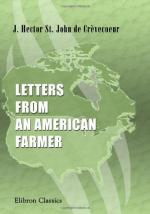till your stony up-land and neglect the fine rich
bottom which lies before your door? Had you never
tried, you never had learned how to mend and make
your ploughs. It will be no small pleasure to
your children to tell hereafter, that their father
was not only one of the most industrious farmers in
the country, but one of the best writers. When
you have once begun, do as when you begin breaking
up your summer fallow, you never consider what remains
to be done, you view only what you have ploughed.
Therefore, neighbour James, take my advice; it will
go well with you, I am sure it will.—And
do you really think so, Sir? Your counsel, which
I have long followed, weighs much with me, I verily
believe that I must write to Mr. F. B. by the first
vessel.—If thee persistest in being such
a foolhardy man, said my wife, for God’s sake
let it be kept a profound secret among us; if it were
once known abroad that thee writest to a great and
rich man over at London, there would be no end of the
talk of the people; some would vow that thee art going
to turn an author, others would pretend to foresee
some great alterations in the welfare of thy family;
some would say this, some would say that: Who
would wish to become the subject of public talk?
Weigh this matter well before thee beginnest, James—consider
that a great deal of thy time, and of thy reputation
is at stake as I may say. Wert thee to write
as well as friend Edmund, whose speeches I often see
in our papers, it would be the very self same thing;
thee wouldst be equally accused of idleness, and vain
notions not befitting thy condition. Our colonel
would be often coming here to know what it is that
thee canst write so much about. Some would imagine
that thee wantest to become either an assembly-man
or a magistrate, which God forbid; and that thee art
telling the king’s men abundance of things.
Instead of being well looked upon as now, and living
in peace with all the world, our neighbours would
be making strange surmises: I had rather be as
we are, neither better nor worse than the rest of
our country folks. Thee knowest what I mean, though
I should be sorry to deprive thee of any honest recreation.
Therefore as I have said before, let it be as great
a secret as if it was some heinous crime; the minister,
I am sure, will not divulge it; as for my part, though
I am a woman, yet I know what it is to be a wife.—I
would not have thee, James, pass for what the world
calleth a writer; no, not for a peck of gold, as the
saying is. Thy father before thee was a plain
dealing honest man, punctual in all things; he was
one of yea and nay, of few words, all he minded was
his farm and his work. I wonder from whence thee
hast got this love of the pen? Had he spent his
time in sending epistles to and fro, he never would
have left thee this goodly plantation, free from debt.
All I say is in good meaning; great people over sea
may write to our town’s folks, because they
have nothing else to do. These Englishmen are




